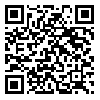Volume 31, Issue 8 (11-2023)
JSSU 2023, 31(8): 6965-6976 |
Back to browse issues page
Download citation:
BibTeX | RIS | EndNote | Medlars | ProCite | Reference Manager | RefWorks
Send citation to:



BibTeX | RIS | EndNote | Medlars | ProCite | Reference Manager | RefWorks
Send citation to:
Moini A, Malekzadeh F, Navid B, Mohammadi M, Omani-Samani R. Psychometric of the Persian Version of Shift Work Disorder Questionnaire in Employee Women. JSSU 2023; 31 (8) :6965-6976
URL: http://jssu.ssu.ac.ir/article-1-5955-en.html
URL: http://jssu.ssu.ac.ir/article-1-5955-en.html
Abstract: (1713 Views)
Introduction: Shift work disorder (SWD) is a sleep disorder that affects the circadian rhythm and is characterized by symptoms such as excessive daytime sleepiness and insomnia. This condition can significantly increase the risk of accidents and diminish the overall quality of life for individuals affected by it. Therefore, using the four-question of shift work disorder questionnaire (SWDQ) can be useful for identifying people at risk of SWD. In this research, we evaluated the accuracy and consistency of the Persian adaptation of the SWDQ among female employees.
Methods: In this descriptive cross-sectional investigation, a sampling available method was employed to select employed women who were referred to Royan Institute, Arash Hospital, and Gynecological Office in Tehran. It was used translated and reverse translation methods for the questionnaire of SWDQ. Statistical analysis was performed by using the Statistical Package for the Social Sciences (SPSS version 16, Inc. Chicago, IL, USA).The tests used in this study were Cronbach's alpha, internal correlation, and confirmatory factor analysis.
Results: In terms of content validity rate (CVR) with an average of 70% (questions 80%, 80%, 60% and 60%, respectively) and content validity index (CVI) with an average of 87.5% (questions 100%, 90%, 80% and 80%, respectively) was acceptable. The internal homogeneity of the SWD questionnaire with Cronbach's alpha was 63.4% and deleting each of the four items of the questionnaire reduced it. Moreover, the range of total correlated changes for the questionnaire was from 0.339 to 0.488, which was more than the minimum of 0.3.
Conclusion: Overall, the validity and reliability of the Persian version of SWDQ (the four-item) have acceptable.
Corresponding Author:Farideh Malekzadeh
View Orcid in Profile
You can search for this author in PubMed Google Scholar Profile
Methods: In this descriptive cross-sectional investigation, a sampling available method was employed to select employed women who were referred to Royan Institute, Arash Hospital, and Gynecological Office in Tehran. It was used translated and reverse translation methods for the questionnaire of SWDQ. Statistical analysis was performed by using the Statistical Package for the Social Sciences (SPSS version 16, Inc. Chicago, IL, USA).The tests used in this study were Cronbach's alpha, internal correlation, and confirmatory factor analysis.
Results: In terms of content validity rate (CVR) with an average of 70% (questions 80%, 80%, 60% and 60%, respectively) and content validity index (CVI) with an average of 87.5% (questions 100%, 90%, 80% and 80%, respectively) was acceptable. The internal homogeneity of the SWD questionnaire with Cronbach's alpha was 63.4% and deleting each of the four items of the questionnaire reduced it. Moreover, the range of total correlated changes for the questionnaire was from 0.339 to 0.488, which was more than the minimum of 0.3.
Conclusion: Overall, the validity and reliability of the Persian version of SWDQ (the four-item) have acceptable.
Corresponding Author:Farideh Malekzadeh
View Orcid in Profile
You can search for this author in PubMed Google Scholar Profile
Type of Study: Original article |
Subject:
Psychology
Received: 2023/03/12 | Accepted: 2023/08/6 | Published: 2023/11/6
Received: 2023/03/12 | Accepted: 2023/08/6 | Published: 2023/11/6
Send email to the article author
| Rights and permissions | |
 |
This work is licensed under a Creative Commons Attribution-NonCommercial 4.0 International License. |







